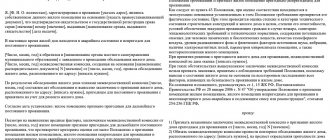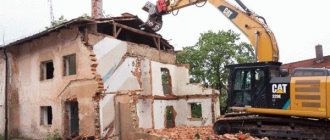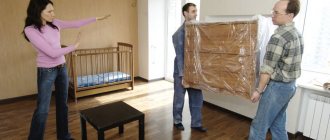The service life of any building expires over time, its structure wears out, and building materials become unusable. At this time, many citizens live in residential buildings that have already fallen into disrepair and are quite dangerous for the lives of the residents.
By law, they must be moved to new apartments or ones that meet all housing requirements. But in order for resettlement to take place, a conclusion must be obtained recognizing the house as unsafe, which is issued by a special non-departmental commission.
The interdepartmental commission for recognizing housing as unsafe must conduct an examination, inspect the house, issue a decision on its condition and the need to relocate residents. Such a housing commission resolves a whole range of important, responsible issues, so when creating it and selecting members you need to be very demanding and attentive.
Creation
What is MVK? The city commission for resolving housing issues is an organization that residents of dilapidated buildings can contact before filing a claim in court . The meeting of the interdepartmental commission is held with an agenda to recognize the house as unsafe.
Those who have apartments in the building must be given new housing by decision of the commission. If city authorities do not yet have such an opportunity, they must provide residents with funds to purchase new living space.
Events
Having considered the administrative claim of the Commissioner for Human Rights in Russia, the Presnensky District Court of Moscow restored the housing rights of K., who is an orphan. The decision of the Moscow City Interdepartmental Commission to refuse to provide K. with housing was declared illegal; this issue will be considered again.
In March 2021, the Commissioner was contacted by a native of Yakutia, K., who was orphaned in early childhood and had been raised in the family of a guardian aunt in the Moscow region since 1992. K.’s place of residence was determined by the place of residence of her guardian; the living quarters were not assigned to her. In 2002, K. and his guardian aunt became the owners of a room in Moscow with a living area of 14 square meters, in which they have lived permanently since 2007 and in which K.’s son, born in 2015, is also registered. At the same time, K. alternately had registration at her place of residence in the Moscow region, then in Moscow. K. has no other room of his own except for ½ share.
In order to improve her living conditions, in 2014, K. applied to the City Interdepartmental Commission with a request to provide her with living quarters in Moscow under a specialized rental agreement as a person from among orphans. The Department of Social Protection of the Population of the Bogorodskoye District of Moscow supported K.’s appeal, establishing that her further residence in the room was impossible, since the living area per resident did not meet social standards.
However, the interdepartmental commission refused to provide K. with housing. Due to the fact that K. previously had registration in the Ramensky district of the Moscow region, the commission considered that Moscow was not her place of residence.
The Commissioner, having conducted an inspection together with the prosecutor's offices of Moscow and the Moscow region, came to the conclusion that the commission's decision did not comply with the provisions of federal legislation and regulatory legal acts of Moscow, and filed an administrative claim with the Presnensky District Court of Moscow.
The court upheld the claim and declared the commission’s decision illegal, obliging the commission to reconsider K.’s question about the one-time provision of comfortable living quarters in Moscow. At the same time, the Commissioner’s arguments were fully reflected in the court decision: for K., the place of residence is Moscow, and the provision of residential premises must be carried out at the place of residence on the same conditions without any preferences, exceptions, restrictions of a discriminatory nature and regardless of the presence (absence) registration at the place of residence.
Composition of the commission
The activities of the interdepartmental commission must comply with the norms of the Housing Code, the Constitution of the Russian Federation, Government Resolution No. 47, and other important documents.
The recognition of an apartment in an apartment building as unsafe is carried out by a specially created body - an interdepartmental commission.
There may be a different number of people in it, depending on the region the composition may differ slightly. But there is a certain procedure for creating the IMC, according to which among the members of the commission there should be deputies and representatives of the local administration of the locality.
Someone from the architecture department is also selected. Other organizations whose employees must be on the commission’s list include BTI and the Ministry of Emergency Situations. Someone from Rospotrebnadzor will definitely get involved. If desired, you can supplement the composition with other people.
ATTENTION! A housing commission is created and its composition is approved by local government bodies.
The creation of a commission also implies the election of its chairman. This responsible person is usually selected from among the representatives of the executive branch . The Chairman has many important and responsible functions that must be performed at a high level:
- He leads the meeting and raises important questions during it.
- This person also performs a representative function, because the commission will definitely need to interact and resolve many issues with various organizations and departments.
- Signs the house inspection protocol and other important documents for the assessment of residential premises.
- The chairman must constantly communicate with other members of the commission, give them work assignments, and initiate meetings.
A competent secretary is also selected to assist the chairman, who will keep records of documents, prepare and compose them.
Ministry of Foreign Affairs of the Russian Federation
The commission was formed by a joint order of the Russian Ministry of Foreign Affairs, the Russian Ministry of Internal Affairs, the Russian Ministry of Defense, the Russian FSB and the Russian Foreign Intelligence Service dated April 14, 2006 No. 4301/264/158/160/22, agreed with the State Legal Department of the President of the Russian Federation, the Office of the Government of the Russian Federation, Ministry of Economic Development of Russia, Ministry of Industry and Trade of Russia and FSO of Russia. The activities of the MVK are ensured by the Russian Ministry of Foreign Affairs. The Chairman of the Commission is Deputy Minister of Foreign Affairs of the Russian Federation G.M. Gatilov. The IAC Secretariat is part of the Department for Humanitarian Cooperation and Human Rights of the Russian Ministry of Foreign Affairs.
Through the Department of Information and Press of the Russian Ministry of Foreign Affairs, the Commission informs the Russian public and the media about its activities on a monthly basis and based on the results of the calendar year.
Address of the Commission: 119200, Russia, Moscow G-200, Smolenskaya-Sennaya sq., 32/34, Ministry of Foreign Affairs of Russia, DHHR (MVK), telephones: +7 (499) 244-49-39, fax: + 7 (499) 244-31-01.
APPLICANT’S QUESTIONNAIRE TO THE INTERDEPARTMENTAL COMMISSION IN CONNECTION WITH LIMITATIONS OF THEIR RIGHT TO EXIT FROM THE RUSSIAN FEDERATION
COMPOUND
Interdepartmental commission for consideration of citizens' appeals
Russian Federation in connection with restrictions on their rights
to leave the Russian Federation
(as of December 10, 2021)
| № | FULL NAME. | Position, organization |
| VERSHININ Sergey Vasilevich |
| |
| ALYAUTDINOV Rinat Zhafyarovich |
| |
| TOKALIN Sergey Nikolaevich |
| |
| RYAZSKY Sergey Vyacheslavovich |
| |
| AKSYONOV Alexander Anatolevich |
| |
| OBLANENKO Andrey Aleksandrovich |
| |
| MARTYNOV Vladimir Nikolaevich |
| |
| MIKHEEV Sergey Nikolaevich |
| |
| SUBBOTKIN Dmitriy Sergeevich |
| |
| GUBAREV Vladimir Fedorovich |
| |
| IVANOV Oleg Yurievich |
| |
| STRATIYCHUK Alexander Vasilevich |
| |
| DOBRYCHENKO Alexander Vladimirovich |
| |
| KOMKOV Oleg Vasilevich |
|
Tasks
A commission of this kind is created for a specific purpose - it should deal with the recognition of the disrepair of the house and the issues of relocating residents from it . But such a function is complex, responsible and involves performing a whole range of tasks.
The safety of people depends on the correctness of the decision made by the commission; often this decision must be made within 24 hours. Responsible persons conduct a comprehensive examination and resolve the issue of the need to urgently relocate people from a house that could collapse at any moment. How to recognize a building as unsafe and unfit for habitation?
- If there is a high degree of deterioration of building materials, as proven by an inspection by the commission, the building is recognized as being in disrepair. The wear rate must be at least 65%.
- In addition to the decision on dilapidation and emergency conditions, there must also be a decision on the demolition of the building. Only if these documents are available does the question of urgent relocation of residents arise.
Residents of the house themselves, who fear for their safety, can call the housing commission. But after its work, the commission may make different decisions. The need for major repairs or restoration may be determined.
Also, members of this important body may decide that the building is still suitable for habitation, judging by the degree of deterioration of the building materials. Also among the solution options are recognition of the house as dilapidated and subject to demolition, recognition as dilapidated, unsafe due to wear and tear of materials, violation of sanitary standards.
Residents who submitted an application for inspection, indicating the exact address of the property, must receive notification of the work carried out and the decision made by the commission.
Watch the video: Compensation for emergency housing during resettlement
How does it work
- To call the commission, you only need to contact the local government body. For the call, an application and a certificate about the condition of the apartment building are drawn up. A plan of the building where applicants reside is also required. If the building management does not have such a plan, it can be ordered from the BTI.
- Before calling, you should conduct an inspection of the house with the help of a group that will include representatives of the Management Company and the residents themselves making the call.
- If the house is private, you will need title documents.
The more residents sign an application for inspection to declare the house unfit for living, the faster the response to the application will be.
The concept of an interdepartmental commission
Not all citizens understand what an interdepartmental commission is, so it is worth considering this issue in more detail to find out why this commission is being created and what functions it performs.
So, the interdepartmental commission is an executive body that is created by local authorities at the local level.
This commission evaluates and inspects houses in order to recognize them as suitable or unsuitable for living, in order to recognize the housing as unsafe and as one that should be demolished or reconstructed.
In its activities, the commission is guided by laws such as the Housing Code of the Russian Federation, Regulation No. 47 of January 28, 2006 “On recognizing premises as unfit for habitation,” as well as other norms and rules approved in specific areas.
An interdepartmental commission to recognize a house as unfit for habitation is created and approved by a resolution of the local government authority (the mayor) consisting of 15 people, including the chairman and deputy chairman.
The commission considers applications to recognize housing as unsafe only if more than half of the commission members are present at the meeting.
The commission makes a decision by voting by a majority vote. The result of the commission’s work is the drawing up of a conclusion on the decision made and the signing of a protocol.
Determining the condition of the house
Indicators of the dilapidated condition of a house are varied. The commission may reveal:
- Violation of the integrity of walls, roof, foundation.
- Deformation of the structure, threat of collapse of walls or other elements.
- The location of the house is in a dangerous flood zone, which creates an accident rate.
- Non-compliance of the residential premises with SanPin standards. For example, there is radiation contamination indoors.
A house that is not connected to utilities and cannot be connected due to technical reasons can be considered emergency. A house can only be recognized by an interdepartmental commission as dilapidated, but not in disrepair.
IMPORTANT! In most cases, a renovation project is developed for houses recognized as dilapidated, but they are not demolished as they are in emergency condition.
Dilapidated houses, even with difficult living conditions, do not pose a threat to the lives of those living in them.
The commission is conducting a full study of all materials on the case. Residents' applications, a professional opinion from the BTI, and an independent expert opinion are considered.
Members of the commission must also draw up a list of those papers that will allow a detailed study of the condition of the house. Based on the recommendations of the commission, a group of experts is assembled who can accurately determine how bad the condition of the house is, whether it is possible to live there for a certain period of time or whether it is dangerous.
Then the commission must make a decision that the residents of the house expect. The duties of the commission include not only studying documents, it is also obliged to visit the site itself and carefully inspect it.







